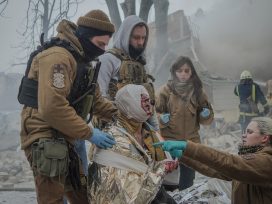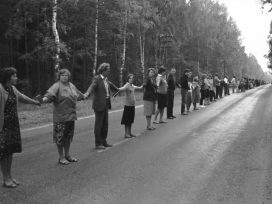Putin’s reset
Russia’s popular vote approving the ‘zeroing’ of Putin’s terms has been hailed by the regime as a triumphant demonstration of trust. Putin’s uncontested status as supreme authority has indeed been reinforced. But will the legitimacy bought by the vote be enough to stem growing uncertainty among elites and declining support among urban constituencies?
Russia’s popular vote approving the constitutional amendments that, above all, enable Putin to run for two more six-year terms – in 2024 and 2030 – has been widely seen by Kremlin critics as a major step in the country’s authoritarian transformation. The day after the vote, on 2 July, Putin’s pressman Dmitry Peskov called it ‘a triumphant referendum of trust’ in the Russian president. With almost 78 per cent voting in favour of the amendments and a turnout of 65 percent, the results were indeed impressive. Whether they can be trusted is another matter. Kremlin critics claim that the unorthodox, week-long voting process – ostensibly in response to health concerns – facilitated electoral fraud on a grand scale.
Less than four months after the coronavirus pandemic had forced Putin to postpone the vote and to withdraw into self-isolation, he reappeared as the nation’s invincible leader. But as he thanked Russians for their support, Putin sounded hurried and distracted. Very little time had passed since the collapse of the Soviet Union, he said; after twenty years of his uncontested rule he described Russia as ‘still very vulnerable, too many things are still … done in a slipshod manner’. Despite the show of popular endorsement, Putin looks weaker and his regime less solid than ever before.
The ‘zeroing’ of Putin’s presidential terms
Putin announced that the Russian constitution was to be amended in his annual address to the Duma in January 2020. This fact alone was not unexpected: the ‘spectre of 2024’, the year when Putin’s current six-year term will end, had been generating speculation about a move to reformat his system of government. What was unexpected, however, was the timing of Putin’s announcement, as well as the content and scale of the amendments. After announcing the reform, Putin replaced his prime minister and dismissed the cabinet. He did not explain why such reshuffling was needed and offered only a very vague explanation of why the constitution needed to be revised. Political observers were left guessing what configuration of power Putin envisioned beyond 2024. All agreed, however, that even after 2024, Putin would keep supreme political power in his hands, even if he technically stepped down.
On 10 March, shortly before the vote in the Duma, one more amendment was added to the already very long list compiled by a hastily convened commission. The last-minute change was proposed by the Duma member Valentina Tereshkova, the first woman cosmonaut and loyal functionary both during Soviet times and since. Tereshkova’s amendment would enable Putin to start his presidency ‘from scratch’ after his current term expires, and to run again for two six-year terms in 2024 and 2030.
As soon as Tereshkova made her proposal, Putin arrived in the Duma and agreed to the amendment on the condition that the Constitutional Court approved it. Like any other political institution in Russia, it was fully amenable to Putin’s wishes – to the outrage of many constitutional lawyers (some referred to the ‘zeroing’ of the presidential terms as a ‘constitutional catastrophe’ and a ‘constitutional coup’). Following the Constitutional Court’s approval, both federal and regional legislatures approved the amendments at lightning speed.
As well as endowing the president with even broader authority than before, the amendments included a number of ‘social’ provisions that define, in particular, broader material support for the citizens, such as regular pension indexation and a guarantee that the minimum wage cannot be below the subsistence rate. There are also ‘ideological’ provisions, such as the ‘protection of historical truth’– which bans ‘belittling the significance of the people’s feat of defending the Fatherland’ – and an exclusive definition of marriage as a ‘union of man and woman’.
Obviously aware that the ‘zeroing’ amendment did not enjoy broad popularity – a March poll conducted by the Levada Centre showed that 47 per cent did not approve of ‘Tereshkova’s amendment’ – state campaigning focused on the ‘social’ and ‘ideological’ provisions, whose popularity was in no doubt. Putin emphasized that the amendment of the constitution would have to be approved by a ‘popular vote’. Such an endorsement was legally unnecessary and was scheduled to be held after all legal procedures had been conducted. But apparently, it was politically necessary to present the constitutional changes, and especially the ‘zeroing’ trick, as an expression of popular will. According to reports, Putin’s goal was to get more votes in favour of the amendments than the 33 million in support of the 1993 constitution, with a turnout of over 55 per cent.
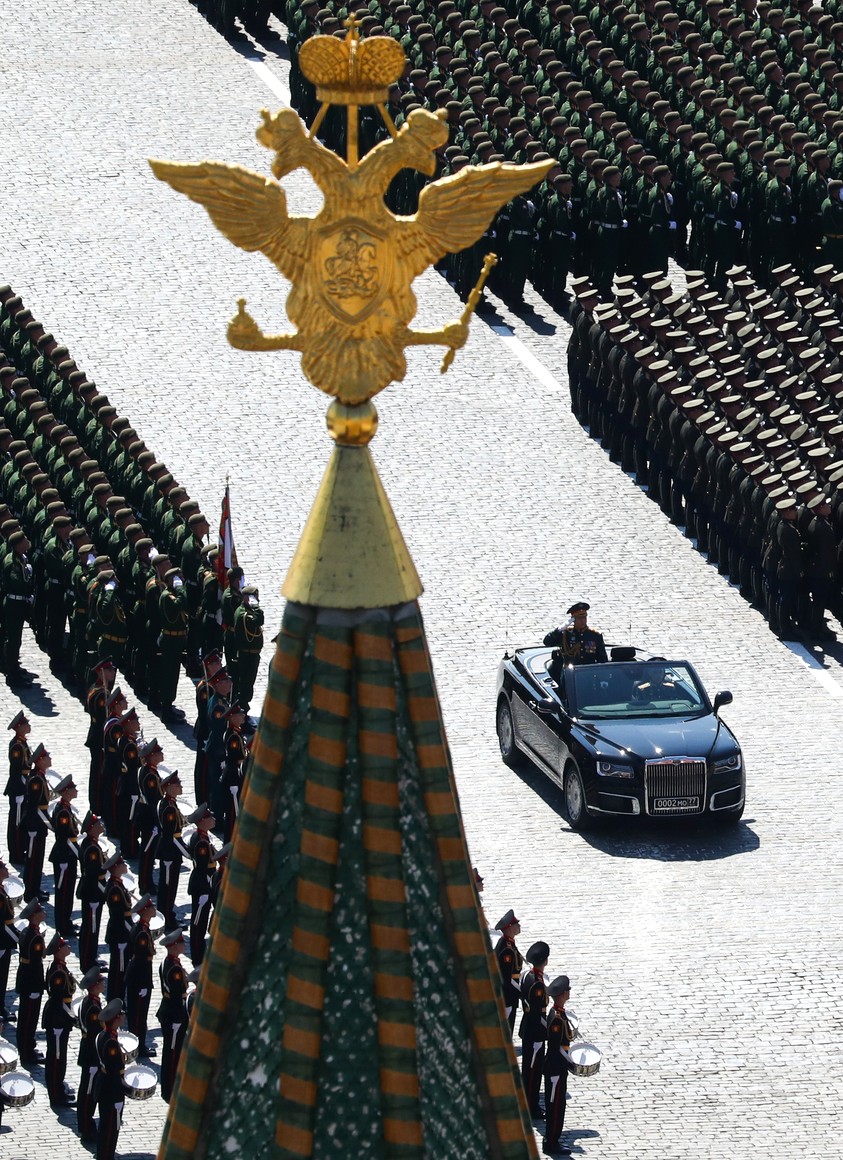
2020 Moscow Victory Day parade, 24 June 2020. Photo by kremlin.ru via Wikimedia Commons CC BY 4.0
Putin retreats
The ‘spectre of 2024’ had been threatening to turn Putin into a lame duck and introduce uncertainty into the system of personalized power that has ensured stability in Russia for two decades. The ‘zeroing’ was to reinstate certainty by effectively putting an end to speculations as to what was in store for Russia come 2024. Judging by the jokes about ‘zeroing’ exchanged on social networks, to many in Russia it looked like a not particularly subtle trick. But only a small number of individuals dared express their dissatisfaction publicly.
The vote on the constitutional amendments was planned for 22 April. Of those willing to turn out, polls indicated that a majority were going to vote for the amendments. Putin had good reason to be optimistic. Besides, soon after, Russia was going to celebrate the 75th anniversary of the victory in the ‘Great Patriotic War’. The military parade was to be even more grandiose than those of previous round anniversaries and would strengthen Putin’s image as the leader of a great nation that had defeated Nazism.
Finally, despite the inauspicious economic situation in recent years, the government claimed that sufficient funds were available for it to deliver on the provisions contained in the ‘social’ amendments. In 2021, when parliamentary elections are due to take place, certain needy constituencies, such as families with many children and the lowest-income groups, were to benefit from the government’s generosity.
All those plans were scuppered by the pandemic. In late March, Putin yielded and postponed both the popular vote and the Victory Day parade. Putin is a politician who has repeatedly demonstrated that he never gives in – whether to international sanctions or to terrorist hostage-takers. But the coronavirus forced him to retreat.
Rule by approval rating
The economic losses inflicted by the coronavirus have been huge in all countries affected, however the situation in Russia has been exacerbated by the significant drop in the price of oil. The sudden disruption of people’s habitual lifestyle, including lockdowns and other restrictions, generated confusion and uncertainty. Putin’s approval rating, which had been in decline even before the pandemic, continued to fall. In March, it was at 63 per cent, six points lower than in February.
Putin’s huge public support has allowed him to rule uncontested for two decades. He has the unconditional loyalty of the Russian elites and is universally recognized as a supreme arbiter who single-handedly performs the function of reconciling conflicting political interests. In short: Putin’s high approval ratings are the guarantee of stability in Russia. For that reason, the Kremlin administration, state-controlled national television and, of course, Putin himself constantly work on maintaining his image as a source of all good things for citizens.
There have been several episodes during Putin’s two decades in office when his approval ratings have declined. One such episode was in 2011–12, during the mass protests against parliamentary election rigging. The dip was temporary and by the time it came for Putin to be re-elected as president in 2012 his ratings were back to higher levels. Another time was in 2018, in response to Putin’s announcement of a highly unpopular pension reform (a unique example of Putin choosing to be the bearer of bad news). Having been at 80 per cent ever since the annexation of Crimea in 2014, ratings now dropped to just over 60 per cent. But again, the public mood soon improved and the president’s approval ratings popped back up to just under 70 per cent.
Federalism by necessity
Having postponed the Victory Day parade and the vote on the constitutional amendments, Putin went into self-isolation. He put his newly appointed prime minister, Mikhail Mishustin, in charge of handling the pandemic and endowed Moscow mayor Sergey Sobyanin with additional powers. Sobyanin looked like a logical choice: Moscow, Russia’s largest city by far, had been hit the most by the pandemic. In mid-April about 60 per cent of all infections in Russia were registered in the capital. Sobyanin had the experience: he has governed the 12-million city and managed its gigantic budget for ten years. Mishustin and Sobyanin promptly announced a range of strict quarantine measures. The authority of regional governors was also expanded to enable them to make policy decisions based on the health situation in their regions.
Given Russia’s federal structure, it may seem natural that governors carried responsibility for the safety of citizens in their own regions, especially since the epidemiological situation varied significantly across the country. However, federalism in Russia has long existed in name only. Technically, governors are popularly elected, but it is the Kremlin that picks the candidates. With rare exceptions, they are ‘outsiders’ with no ties or roots in the region they are to govern. Shortly after the pandemic struck Russia, the governors of the Komi republic, Kamchatka and Arkhangel’sk oblast’ submitted their resignations – no doubt after being ‘prompted’ to do so by the Kremlin.
Total dependence on the Kremlin bosses, rather than accountability to their voters, has long discouraged regional leaders from taking the initiative. As bureaucrats accustomed to implementing orders from above, governors lacked the skills and resources necessary to carry out the tasks that now fell to them. The quality of healthcare, like that of life in general, is very uneven across Russia’s regions. Moscow’s hospitals are better equipped and have more and better trained staffed than anywhere else in the country.
By early April, infections in Russia had reached ten thousand. The situation, particularly in Moscow, resembled that in many western countries: social networks were filled with reports of shortages of PPE and medical equipment; doctors wrote about non-stop arrival of patients and heavy overload on medics. However, thanks to Moscow’s advantages, as well as to Sobyanin’s effective management, the situation in the capital was soon brought under control and catastrophe avoided. Quarantine measures were strict, but not unreasonable, and even though the city government threatened to penalize violators, in practice the police showed moderation. Apparently, Sobyanin and his associates understood that self-isolation was hard on people and that violations were inevitable – and decided that excessive stringency would make things worse.
Putin’s self-isolation
Putin continued to address the public on TV and hold video conferences with officials, but speaking from isolation made him seem distant and not fully in charge. That Mishustin and Sobyanin were seen as busily taking decisions reinforced this impression. At the emotional level, too, Putin seemed out of touch with people’s experience. His difficulty in showing empathy has been revealed on numerous occasions during his two-decade leadership, and this time was no exception. He was also slow in promising financial assistance, giving the impression that small and medium business were being abandoned by the state. When he finally did announce support in mid-April, economists promptly pointed out that it was insufficient and much smaller in proportion to the GDP than the packages allocated in western countries. Since resources were scarce, government assistance was expected to be selective, with the largest corporations, as well as businesses with greater lobbying power, the primary recipients.
Government assistance to the regions was described by Natalia Zubarevich, Russia’s prominent expert on the economy of the regions, as ‘stingy’. Most Russian regions are not economically independent and have to rely on federal subventions (a powerful tool to keep governors loyal). During the pandemic, regions were likely to receive additional emergency assistance, Zubarevich said, only if they found themselves in especially dire straits (for instance, if a region’s budget did not have enough funds to pay government salaries) or had greater means to influence the Kremlin. Others often had to wait longer and received only a fraction of what they needed to cover the financial losses incurred during the pandemic.
While Sobyanin’s Moscow government performed effectively, the situation elsewhere was quite different. In many places, hospitals suffered from acute shortages of PPE and had to draw on outdated medical equipment. Local bosses, concerned more about pleasing the Kremlin than saving people’s lives, were prone to hiding their problems and reporting lower infection rates. One of the worst outbreaks took place in Dagestan, whose top administrators dramatically under-calculated the number of infections and deaths, and failed to report shortages of hospital beds, medical equipment and medication. It took a ‘rebellion’ by Dagestan’s minister of health to remedy the situation.
Head doctors not infrequently hushed up medics’ complaints and threatened doctors who dared talk about their hospitals’ problems on social media or to journalists. While most countries faced the problem of shortages and overwhelmed health workers, the callousness of hospital administrators appears to be a typically Russian problem. Just like the governors, head doctors are part of the ‘bureaucratic vertical’ and often show no solidarity with the medics working under their supervision. The result was an extremely high number of fatalities among health workers: according to one government official, by mid-June the total had reached almost five hundred. The overall COVID fatality at that point was about 7600 and the number of infections over 560 thousand.
Return to the limelight
Around mid-April, Putin – still in self-isolation – grew more active and began demonstrating that he was still the top decision-maker. In late May, as the situation in Moscow was slowly beginning to improve, he announced new dates of both postponed events: the military parade was rescheduled for 24 June (the date of the original Victory Parade in 1945) and the popular vote on the constitutional amendments immediately after that.
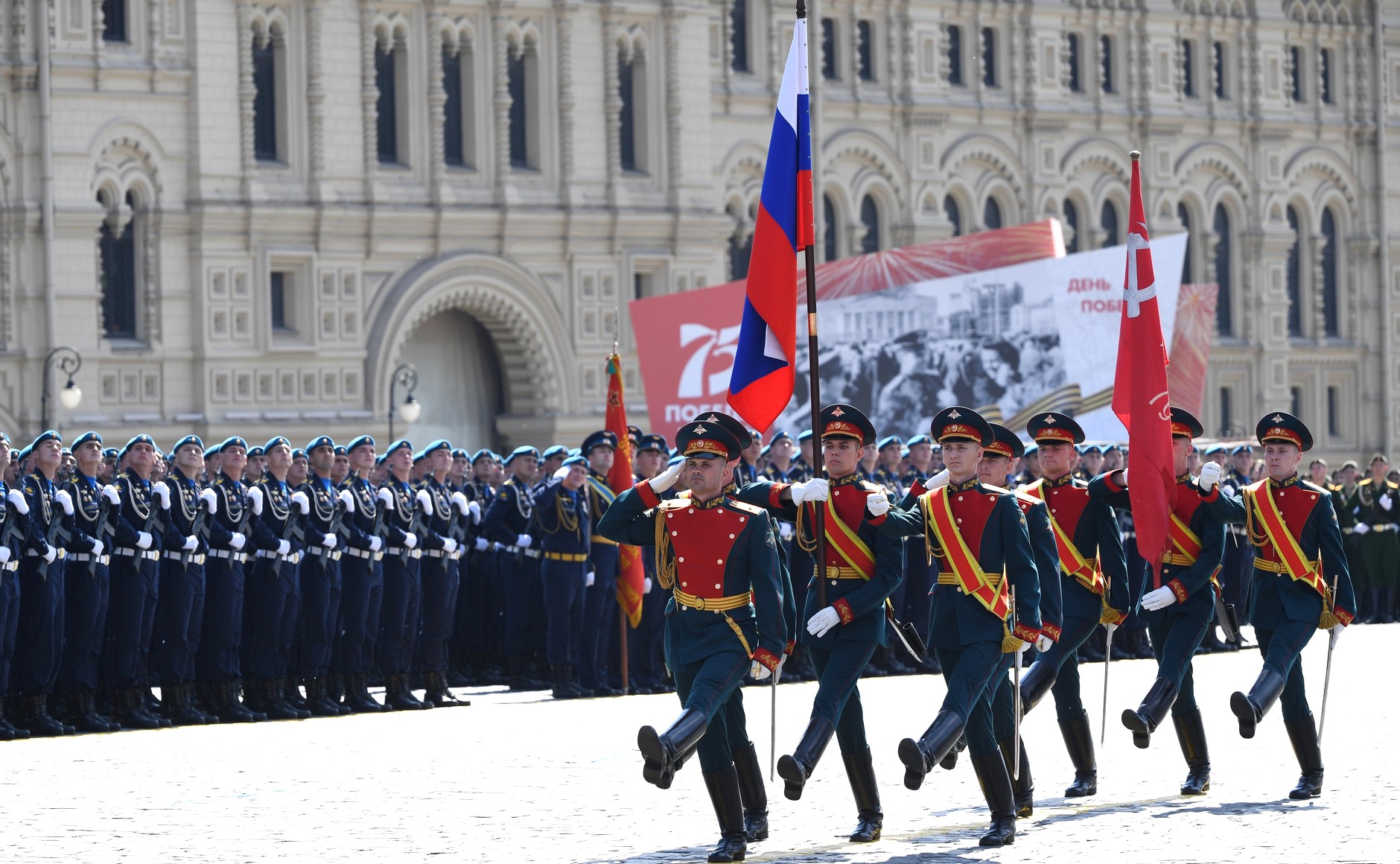
2020 Moscow Victory Day parade, 24 June 2020. Photo by kremlin.ru via Wikimedia Commons CC BY 4.0
In Moscow people were getting tired of the quarantine: violations were becoming numerous and the city government realized that trying to enforce them might backfire. The Kremlin also obviously decided it wanted people to be in good spirits in time for the vote that was to endorse Putin’s extended presidency. The quarantine restrictions were therefore abruptly lifted. The government apparently expected that ‘feeling free’ instead of being locked down, and celebrating the victory over Nazi Germany seventy-five years ago and now over the coronavirus, would generate an upbeat mood for the referendum.
From an epidemiological perspective, these moves were risky. Many cities cancelled their local parades or staged them crowd-free. Sobyanin, who had no choice, called for Muscovites to stay home and watch the parade on TV. Concerned that the rapid relaxation might lead to a new rise of infections, he also sought to lift the restrictions more gradually but, it is said, had to comply with Putin’s will. According to one report, Sobyanin’s cautious stance, as well as the prominence he had gained in successfully handling the pandemic, had caused Putin’s displeasure.
The annual victory parade is traditionally one of the major TV events of the year, always attracting a very large TV audience. This year, according to veteran TV critic Arina Borodina1, ratings hit a record high, comparable to the Sochi Olympics (TV-viewing in general had gone up during the quarantine).
А travesty of popular will
Motivating people to turn out to vote was a tall order. Since the lockdown, concerns about incomes and jobs had pushed the issue of the amendments to the background. The vote could have been postponed, for instance until the annual election day in September, when many regions will have local elections. But Putin was clearly anxious to receive popular endorsement sooner. ‘Putin’s nervous, in a rush’, said Gleb Pavlovsky, a former Putin adviser and in recent years an insightful commentator on the Kremlin’s behaviour. Pavlovsky suggested that Putin felt unsure of the loyalty of his inner circle and was seeking to protect himself through the special legitimacy that the popular vote would provide.
The government campaign to turn out to vote was intense: the amendments were advertised on ubiquitous billboards. Leaflets were stuck in mailboxes. Russian celebrities extolled the new provisions on TV. Citizens were bombarded by text messages and phone calls, while state-paid and state corporations employees found themselves under pressure from their bosses to register for the vote. The ‘zeroing’ amendment, however, was fully absent from the campaign – the Kremlin, in all likelihood, had data indicating that it was not approved by a sizable proportion of Russians and preferred not to remind them about it. A few days before the voting began, Putin announced new giveaways – apparently, as an additional measure to get out the vote. No campaign against the amendments was allowed. The government claimed that its own campaign in favour of the amendments was merely public information.
The vote itself was a staggering accumulation of lawless tricks. Despite there being 206 individual changes, the ballot included just one question: ‘Do you approve of the changes to the constitution?’ In an unprecedented arrangement, the actual vote-casting lasted for a whole week. Ballot-boxes were delivered, often uninvited, to pensioners – major recipients of the government giveaway and Putin’s most reliable base. Improvised polling sites were established in the most improbable places, such as car boots or tree stumps. Independent observers were denied access to the polling stations, which opened the way for large-scale vote rigging. Electronic voting introduced in two regions – Moscow and Nizhny Novgorod oblast’ – was criticized by independent experts as being fraught with risks of falsifications, since it was impossible to control.
Electoral fraud was further facilitated by the fact that, every hour, polling stations were to be closed ‘for disinfection’, with only the head of the electoral commission allowed to stay inside. Oppositionists who called for people to vote against the amendments or boycott the vote were harassed. In Moscow, a TV Rain journalist who exposed a fraudulent trick aimed at registering individuals for the vote without their knowledge was harassed by law-enforcers. In St Petersburg, the police broke a photographer’s arm when he tried to shoot an electoral commission member being kicked out of his precinct. The list of egregious violations is endless.
What does Putin’s reinforced primacy presage for Russia?
Shortly before the vote, the Kremlin obviously realized that not to mention the ‘zeroing’ amendment at all was too conspicuous a trick. It was even absent in the digest, posted on the official website, explaining what the amendments were about. When journalists asked Putin’s pressman Dmitry Peskov about this glaring omission, he said it was a ‘technical error’. The ‘zeroing’ was subsequently added to the digest, after which high-ranking officials, including Putin himself, mentioned it too.
In a TV interview that was exceptionally fawning even by the standards of Russian state TV, Putin said that he would indeed not rule out running for president in 2024, pointing out that the ‘zeroing’ amendment was needed to prevent ‘eyes from drifting around hunting for successors’. In March, Putin had acknowledged the principle of the alternation of power, while also stressing that stability was the priority at the current time. In June, however, he did not so much as pay lip service to it. Putin’s ‘new legitimacy’ may therefore be described as a codification of Putin’s informal status as Russia’s life-time leader of no alternative.
Andrey Klishas, a member of the upper house who is believed to have played a prominent role in framing the constitutional changes, was even more blunt about rationale for the ‘zeroing’ amendment. The political class, he said, ‘should stop talking about who will succeed Putin or when this will happen … They should stop thinking about what will happen in the future … and get used to the idea that in the future it will all be the same and the president will be able to run again’.
As political commentators have repeatedly pointed out over the years, Putin’s status as uncontested leader rests on his unique public support. For political elites, a continued decline of his rating threatens to erode his authority as the ultimate arbiter. In the words of Sam Greene, ‘what will cause this system of power to end, when eventually it does (of natural causes), is when people come to the conclusion that even the uncertainty of a post-Putin future is better than the certainty of X number more years of the status quo.’
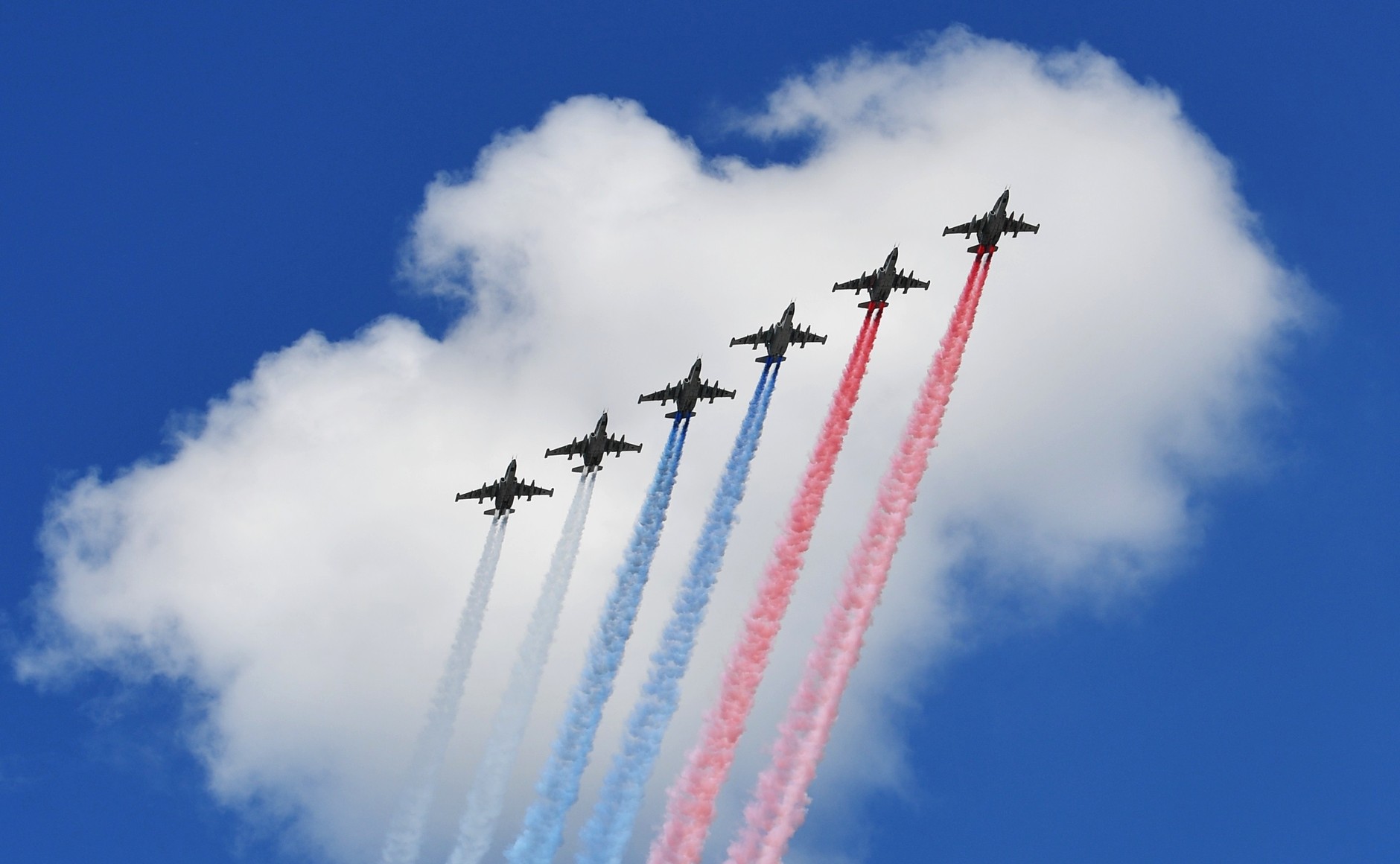
2020 Moscow Victory Day parade, 24 June. Image by kremlin.ru via Wikimedia Commons CC BY 4.0
Is Russia, indeed, moving in that direction? And if it is, how is Putin most likely to respond?
Putin’s electoral base is still broad enough: in June his approval rating was at 60 per cent. But it has been in decline since early this year, and for a few months now pollsters have registered growing public discontent. Putin’s policies deepen the alienation of those beyond his base, especially younger, more entrepreneurial and energetic urban constituencies used to relying on themselves rather than the state. These categories have been economically affected by the pandemic and are highly likely to face serious problems in the near future. The grim economic prospects are likely to aggravate their discontent.
The opponents of Putin’s regime are not a marginal group: according to Denis Volkov of the Levada Center, they are only slightly less numerous than his supporters, with a sizable share of the population not leaning one way or another. For the time being, however, the Kremlin may benefit from opponents being ‘fragmented and disoriented’. There is no anti-Putin bloc and no alternative to Putin in sight.
The result of the vote on the constitutional amendments is a demonstration that Putin’s administration is still capable of mobilizing broad support. It is a signal to the elites that Putin retains supreme power and that they must not ‘hunt for successors’. But public support that relies on egregious violation of rules and procedures is evidence of weakness, not strength. ‘Both the society and the elites could clearly see’ that Putin’s victory came at a cost of ‘fraud and machinations’, commented political analyst Kirill Rogov.
Putin has always been particular about observing the letter of the law, while commonly disregarding its spirit. But the vote was held in full contempt for both. This might explain Putin’s hasty tone as he expressed his gratitude to the people for their support. Was it that his triumph failed to fill him with pure joy?
Most commentators agree that the president looks weakened and that the regime’s safety margin has been reduced. A constitution so disrespectfully and hastily rewritten is just words, not a sacred charter. But Putin seems determined to interpret the popular vote as a codification of his absolute power, regardless of his declining support and the growing uncertainty of the elites. This makes him likely to move further towards repressive authoritarianism in order to defend the status quo against those whose eyes may be tempted to drift towards a post-Putin future.
This article is an updated and adapted version of the author’s piece Koronavirus start Kaiserkrönung: Putin’s Verfassung und die Pandemie published by our partner journal Osteuropa in their 3-4/2020 issue.
About one in seven Muscovites watched the parade on Channel One, nationally the number was just a bit lower; a somewhat smaller, but still a very large number of Russian viewers preferred Rossiya-1. Overall, the share of parade-watchers, of all those who had their TV on at that time slot, was an amazing 70 percent. See: https://echo.msk.ru/sounds/2667049.html
Published in
In collaboration with
In focal points
Newsletter
Subscribe to know what’s worth thinking about.
Related Articles
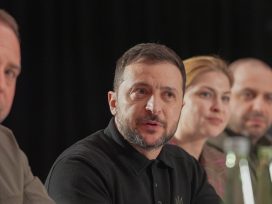
The ‘Trump–Putin deal’ again places Ukrainians in a subaltern role. The leaked contract with its fantasy $500 billion ‘payback’ has been compared to Versailles, but the US betrayal recalls nothing so much as Molotov–Ribbentrop.

Ukraine faces its greatest diplomatic challenge yet, as the Trump administration succumbs to disinformation and blames them for the Russian aggression. How can they navigate the storm?





